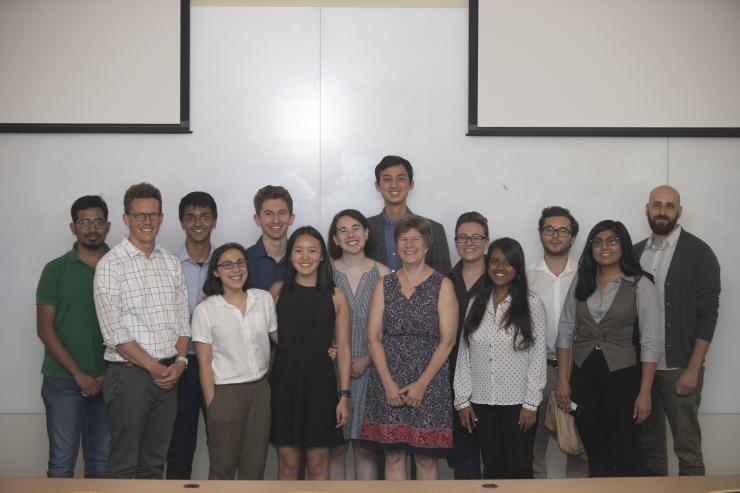Fifth Summer of Civic Data Science Program Presents Community-Focused Solutions
Jul 26, 2018 — Atlanta, GA

Students presented data-oriented solutions for civic problems, from public health to environmentalism, at the Civic Data Science (CDS) finale on July 19.
The 10-week summer program brings college students from across the country to Georgia Tech to use data science research and applications for direct civic and social impact. The National Science Foundation–funded program is now in its fifth year, previously under the name Data Science for Social Good.
This year’s projects addressed gentrification, sustainable transportation, pest control, and environmental monitoring. Each project pairs with local organizations, such as the City of Atlanta and neighborhood planning units, to ensure the work can help the community.
“Community organizations help make sure the kind of problems we’re working on are grounded in reality,” said School of Computer Science (SCS) Professor and program co-director Ellen Zegura. “It’s public problem solving.”
It also lets students see how their data skills can be used outside the classroom.
“The CDS program is unique in that it provides the perfect balance between research and application,” said Michael Koohang, a rising fourth-year student at Middle Georgia State University. “While we conducted formal research during the program, we were also applying our discoveries to tangible pieces of work that had almost immediate impact on local communities.”
For many students, who often come from smaller liberal arts colleges, this was their first opportunity in an environment as large and well-resourced as Tech.
“I knew I was interested in attending graduate school before I came to Tech, but working full-time in a lab, with a mentor and team, has given me invaluable insight about the day-to-day of research,” said Wellesley College rising third-year student Annabel Rothschild.
Tech’s focus on interdisciplinary research also showed students the potential fields they could go into.
“Prior to coming to CDS, I had a lot of difficulty trying to figure out how to combine both my majors, statistical and data sciences and government, into something that excited me,” said Arielle Dror, a rising third-year student at Smith College. “Spending time in a bigger university than my own home institution showed me the exciting world of interdisciplinary research.”
Zegura co-runs the program with Literature, Media, and Communication (LCM) Associate Professor Christopher Le Dantec. They also use the support of faculty mentors: School of Public Policy Assistant Professor Omar Asensio, LCM Associate Professor Carl DiSalvo, LCM Assistant Professor Yanni Loukissas, SCS research scientist Amanda Meng, and School of Civil and Environmental Engineering Associate Professor Kari Watkins.
The four projects included:
Project: Rat Watch by Winne Luo and Michael Koohang
Mentors: Carl DiSalvo, Amanda Meng, Ellen Zegura
Problem: Rats are everywhere, but no reliable public data is kept because rat control is outside city jurisdiction and only homeowners can report rats. Without oversight, rats can increase disease, asthma, stress, and cause infrastructure damage.
Solution: Luo and Koohang created an SMS chat bot where residents could report rat sightings via text. They created an interactive map with this data that lets users toggle between layers of code violations to see where rats are. The map can help city officials direct mitigation efforts and provide citizens with a tool to engage the government into action.
Project: Atlanta Map Room by Annabel Rothschild and Muniba Khan
Mentors: Yanni Loukissas
Problem: Maps often depict an idealized environment created by the population in power and not everyone’s reality. This team wanted to document and reflect upon the connections and disjunctions between civic data and lived experience in Atlanta.
Solution: They created the Atlanta Map Room in Technology Square Research Building, where everyone can collaborate on large-scale, interpretive maps. Using an app that allows users to select an area of the city to focus on and project it on a piece of paper, users can write their experiences on the map and bring their narrative back to the data. The map allows users to critique data and recognize it may not always tell the full story.
Project: Popular Sentiment of U.S. Electric Vehicle Drivers by Arielle Dror, Emerson Wenzel, and Kevin Alvarez
Mentors: Omar Asensio
Problem: Although electric vehicles make up just 2 percent of car sales today, they will be 55 percent in 2050. Despite this boom, charging station experiences are less than accessible.
Solution: This group pulled data from the app Plugshare, where users rate electric vehicle charging stations, to determine how well the current electric vehicle structure serves drivers. They used machine learning to automatically classify all the reviews as having a negative or positive sentiment. Overall roughly 40 percent of drivers have a poor experience at charging stations, a problem that needs to be fixed as the market expands.
Project: Seeing Like A Bike by Nic Alton and Saumik Naraynan
Mentors: Christopher Le Dantec and Kari Watkins
Problem: Traffic in Atlanta grows worse every year, but better bike infrastructure can alleviate congestion. Yet the heaviest trafficked routes often have higher pollution, which adversely affects cyclists’ health.
Solution: Students attached low-cost air quality sensors to bikes and ran a series of calibration tests against high-precision sensing equipment. The data will enable a large-scale deployment of bikes to collect air quality data from around the city, determining which routes are too unhealthy for cyclists.
Tess Malone, Communications Officer




